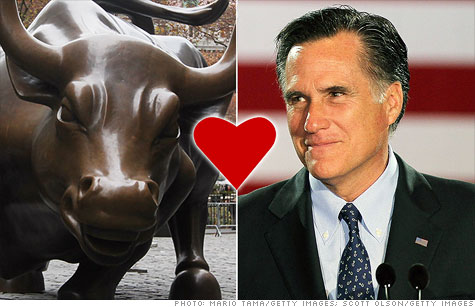In the new issue of National Journal I ask whether Romney's failure to deliver a plan for regulating the financial system has anything to do with the fact that the top eight donors to his campaign are big banks.
I mean, has any
major-party candidate running for president ever been as qualified as Romney, the Wall Street whiz who founded Bain Capital, to understand and reform
the troubled U.S. financial system? At a time when the economy is still
recovering from what many economists say was the worst financial crash in U.S.
history, there would seem to be no better moment for the Republican
presidential candidate to say what he will do than right now, before the
election.
Yet
despite months of promises that he would deliver an alternative to the
Dodd-Frank law, which Romney has relentlessly criticized, no plan seems forthcoming.
In an interview last June, Oren Cass, Romney’s chief domestic policy advisor,
said the candidate and his team were still working on specific regulatory plans
for finance, but that journalists should “stay tuned.”
Three
months later, neither Cass nor Romney spokeswoman Andrea Saul responded to multiple
requests from National Journal this week to indicate whether a plan is in the
works, with just six weeks left in the campaign.
Why the
holdup? According to a financial regulatory expert who has advised the Romney campaign,
it’s not for lack of attention; on the contrary, he says, there have been
months of discussions without resolution. “It’s a no-win political situation,” said the
expert, who cautioned that he is not one of the candidate’s senior advisors and
would address the internal debate only on condition of anonymity. “If you talk about imposing a 15 percent
capital leverage ratio on the banks, which has been discussed, they’ll get
upset. If you support what the banks want, a lot of other people [voters] will
get upset.”
One complicating
factor may be that the top donors to Romney’s campaign are the very Wall Street
banks about which so much debate has swirled, and which remain the very
embodiment of what critics call the “too big to fail” problem. The banks are
engaged in an active effort to unwind Dodd-Frank, but they remain so deeply
unpopular with the public that to endorse their efforts to weaken the law might
seem like weakness or co-option.
According
to the Center for Responsive Politics, which tracks political contributions,
the eight biggest donors to Romney’s campaign consist of individuals and PACs associated
with Wall Street’s most powerful banks. As of mid-September Romney’s top eight contributing
organizations (in other words, those that “bundle” individual contributions) in order of the size of donations were:
Goldman Sachs, $688,080; Bank of America, $541,548; JPMorganChase, $541,019; Morgan Stanley, $535,047;
CreditSuisse Group, 433,785; Citigroup, $369,015; Barclays, $349,400; and Wells
Fargo, $343,000. By contrast, the top eight organizations bundling donations to
Obama’s campaign were, in order, the University of California, Microsoft Corp., Google Inc., Harvard
University, the U.S. government, Deloitte LLP, DLA Piper and Stanford
University.

No comments:
Post a Comment